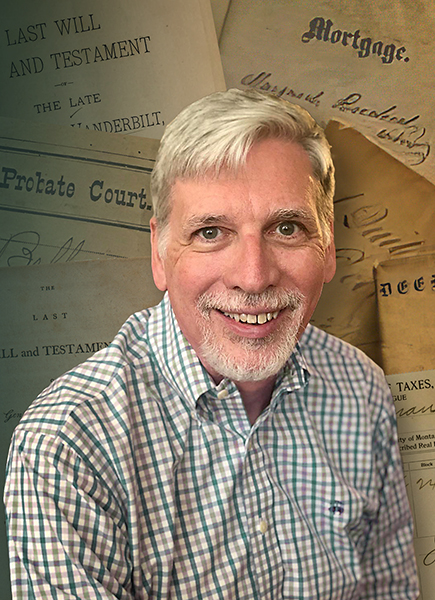Gone to Texas – Finding Your Ancestors in Land and Probate
July 16, 2022

A fifth generation Texan and professional forensic genealogist since 1996, Kelvin Meyers is a frequent speaker to genealogical societies and family associations throughout the United States. He specializes in southern brick wall problems for clients.
Kelvin is a 1989 and 1990 alumnus of the Institute of Genealogical and Historical Research at Samford University and has returned to IGHR as lecturer in the Southern Course and the Professional Courses.
He is member of the Association of Professional Genealogist forensic special interest group and a past board member of APG, a past President of the Lone Star Chapter of APG, and a former member for the Council for the Advancement of Forensic Genealogy (CAFG). He currently serves as the chairman of the history and archives committee of First United Methodist Church in Dallas.
The Dallas Genealogical Society awarded Kelvin the Lloyd DeWitt Bockstruck Distinguished Service Award in December of 2018.
In 2016 Kelvin published Research in Texas for NGS (National Genealogical Society) Research in the States series. Kelvin is also the director of the Texas Institute of Genealogical Research (TIGR) sponsored by the Texas State Genealogical Society.
Kelvin Meyers, Forensic Genealogist
Gone to Texas – Finding Your Ancestors in Land and Probate
Land records, taxes, wills, and probate are staples in genealogical research. Join the Dallas Genealogical Society and Kelvin Meyers for a day of learning how vital these records are for researching our ancestors. Kelvin will use examples and case studies highlighting Texas records.
- Session 1: Plowing Through the Land Records to Find Your Ancestor
Because Americans were so “land-minded,” over ¾ of all males who lived to maturity, well into the 19th century, owned land. Because this is true, land records exist from the beginning of the first permanent settlements in America—frequently one of the few identifying records from this early period. A quality unique to land records is that the older they are, the more genealogical data to obtain from that record. This lecture will focus on using these records, combined with other records, to identify ancestors.
- Session 2: Tracking the Land Tax Records
For most genealogists, a tax list is merely a substitute for a missing census, but there are many other uses for a tax list. When faced with a burned county or other missing records, learn how to use the Texas tax records to track his land holdings, estimate when he came to the county, and when he left or died. Texas tax records are easily accessed and readily available for research.
- Session 3: Probate: More Than a Will
Most persons in America, who lived to adulthood, left some type of an estate to be administered. Some left wills, some did not; either way, if there was land or large amounts of personal property, this estate had to be disposed of. The probate records can be some of the most fruitful for the genealogist. Wills, distributions, administrations, and inventories are all vital parts of the probate process and are full of genealogical information; these are the things that we will discuss in this lecture.
- Session 4: Texas Records & Repositories
The number of online resources of records grows every day. Ancestry.com and FamilySearch.org are two of the largest collections of digitized records. However, city and county archives throughout Texas are digitizing records and compiling indexes as well. Our state archives continue to make records available to us online.
Schedule
Saturday July 16 (all times CT)
| 9:55 | 10:00 | Welcome & Opening Remarks |
| 10:00 | 11:15 | Plowing Through the Land Records to Find Your Ancestor |
| 11:15 | 11:30 | Break |
| 11:30 | 12:45 | Tracking the Land Tax Records |
| 12:45 | 1:45 | Lunch |
| 1:45 | 3:00 | Probate: More Than a Will |
| 3:00 | 3:15 | Break |
| 3:15 | 4:30 | Texas Records & Repositories |
| 4:30 | Closing Remarks |
Cost (USD)
| By June 26, 2022 | After June 26, 2022 | |
|---|---|---|
| DGS Member | $25 | $35 |
| Others | $60* | $70 |
*Become a member of DGS ($35/year) now and get the low member registration price right now!
Join DGSRefund Policy: Requests for refunds made prior to the early-bird cutoff date (June 26, 2022) will be granted (less a $10 handling fee). DGS will not issue refunds after 5:00 pm on June 26, but we will provide a PDF version of the syllabus and access to the recorded lectures for two weeks after the July 16 presentation.
DGS will provide a complimentary lunch for In-Person attendees. You will receive an email a few days before the seminar to designate your choice of menu items; drinks and tables will be available during the lunch hour.
